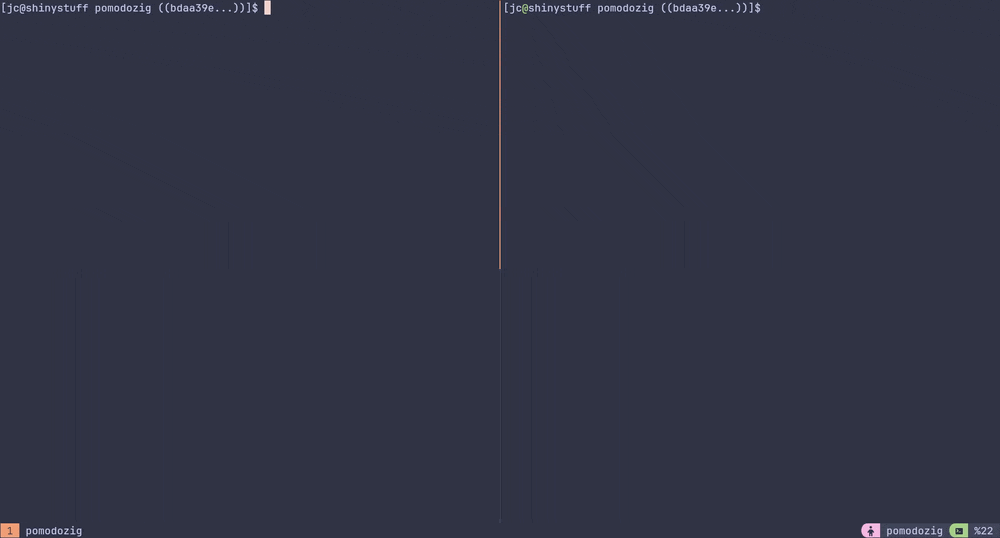Following up my two previous posts about getting a fast compilation loop when working with Haskell in neovim (see here and here), today I want to share a more general approach that works with pretty much any compiled language. I have successfully used it with: C, C++, Java, Rust, Haskell and Zig with no modification whatsoever.
But first, a short demo of me working on one of my projects:

Basically, I have a tmux session with two panes. On the left, I have my code editor neovim. On the right, I have the compiler running each time I save a file.
When the compiler finds an error in my code, with a shortcut I find the error in the compilation panel and yank it. Back to neovim, with another shortcut I jump straight to the error in my code, fix it, save the file, rinse and repeat.
Moving between panes
By default, moving the focus between panes in tmux is done with CTRL-b
followed by an arrow key (as for me, I use CTRL-Space as my tmux prefix). In
neovim, to move the focus between windows, one uses CTRL-w followed by a vim
direction key: h, j, k and l.
I find it cumbersome. To make it easier, I use the neovim plugin tmux.nvim.
With it, one can move the focus with CTRL-h, CTRL-j, CTRL-k and CTRL-l
seemingly between tmux panes and neovim windows.
Check out the README.md of the plugin for details on the configuration.
Compilation pane
For the compilation pane, I run the compiler through feedback. By default, this tool watches for changes in files tracked by git and runs a command on any change. 99% of the time, this is what I want. For the remaining 1%, feedback has a few options to define the files to watch. Have a look at its repository for more information.
Now, to find the error in the compilation pane, tmux is able to search for
regexes. I use this feature in my ~/.config/tmux/tmux.conf and map such
searches to keybindings.
# Find errors and warnings in the current pane
bind C-e copy-mode \; send -X search-backward "[^\s]+:[^\s]+: (error|Error):"
bind C-w copy-mode \; send -X search-backward "[^\s]+:[^\s]+: (error|Error|warning|Warning):"With this configuration, if I hit CTRL-Space (my tmux prefix) followed by
CTRL-e, tmux will search in the current pane for an error and highlight it.
With CTRL-Space followed by CTRL-w, tmux will search for an error or a
warning.
Once the error has been found, I can yank it with Enter. The error string is
now available in the system clipboard and, in neovim, in the + register.
Neovim pane
Back to neovim, to jump to the error I can enter command mode, type :edit
and paste the error string with CTRL-SHIFT-v or CTRL-r-+.
:edit some/file.zig:12:10: error:But don’t hit Enter yet, that’s not a proper vim command. I still need to
edit the line such as:
:edit +12 some/file.zigor even simpler:
:edit some/file.zig | 12Now hit Enter and neovim will jump to the file and line number.
This is already better than trying to find the error by hand, open the file and scroll to the right line number. But we can do better.
Lua to the rescue
Here is a Lua module that can go in your ~/.config/nvim/lua directory. Let’s
call it parse_error_string.lua for example.
local M = {}
local parse_error_string = function(str)
-- src/Parser.hs:(30,3)-(32,11): warning:
local file, line = str:match('([^:]+):%((%d+),%d+%)%-%(%d+,%d+%): .+')
-- src/Parser.hs:10:3-8: error:
if not file then
file, line = str:match('([^:]+):(%d+):%d+%-%d+: .+:')
end
-- src/Model.hs:4:12: error:
if not file then
file, line = str:match('([^:]+):(%d+):%d+: .+:')
end
-- /absolute/path/to/some/java/source.java:229: error:
if not file then
file, line = str:match('([^:]+):(%d+): .+:')
end
return file, line
end
local function file_exists(filename)
return vim.fn.filereadable(filename) == 1
end
local function open_file_line(filename, line)
local line_arg = ''
if line then
line_arg = '+' .. line
end
vim.cmd(table.concat({ 'edit', line_arg, filename }, ' '))
end
function M.open_error(error_str)
local filename, line = parse_error_string(error_str)
if file_exists(filename) then
open_file_line(filename, line)
else
vim.notify('Could not open file: ' .. filename, vim.log.levels.ERROR)
end
end
function M.open_yanked_error()
local error_str = vim.fn.getreg('+')
M.open_error(error_str)
end
return MThe code is pretty straight forward. Most of the work is done in the parsing
function parse_error_string which extract the filename and the line from the
error string. Then the exposed function open_yanked_error reads the +
register, parses the string it contains and opens the file at the right line.
As for calling the function itself, this is the mapping I use:
local parse_error_string = require('parse_error_string')
vim.keymap.set('n', '<Leader>fy', parse_error_string.open_yanked_error,
{ desc = 'Open yanked error' })Now hitting <Leader>fy in normal mode will make neovim jump on the error
found in the compilation pane.
Conclusion
I hope this post has demonstrated that it is not too difficult to set up a good development workflow in the terminal. With a few basic tools, some regexes, a bit of Lua and we can have a fast and efficient compilation loop that is language agnostic.
Feel free to adapt it to your needs and let me know if you like it.